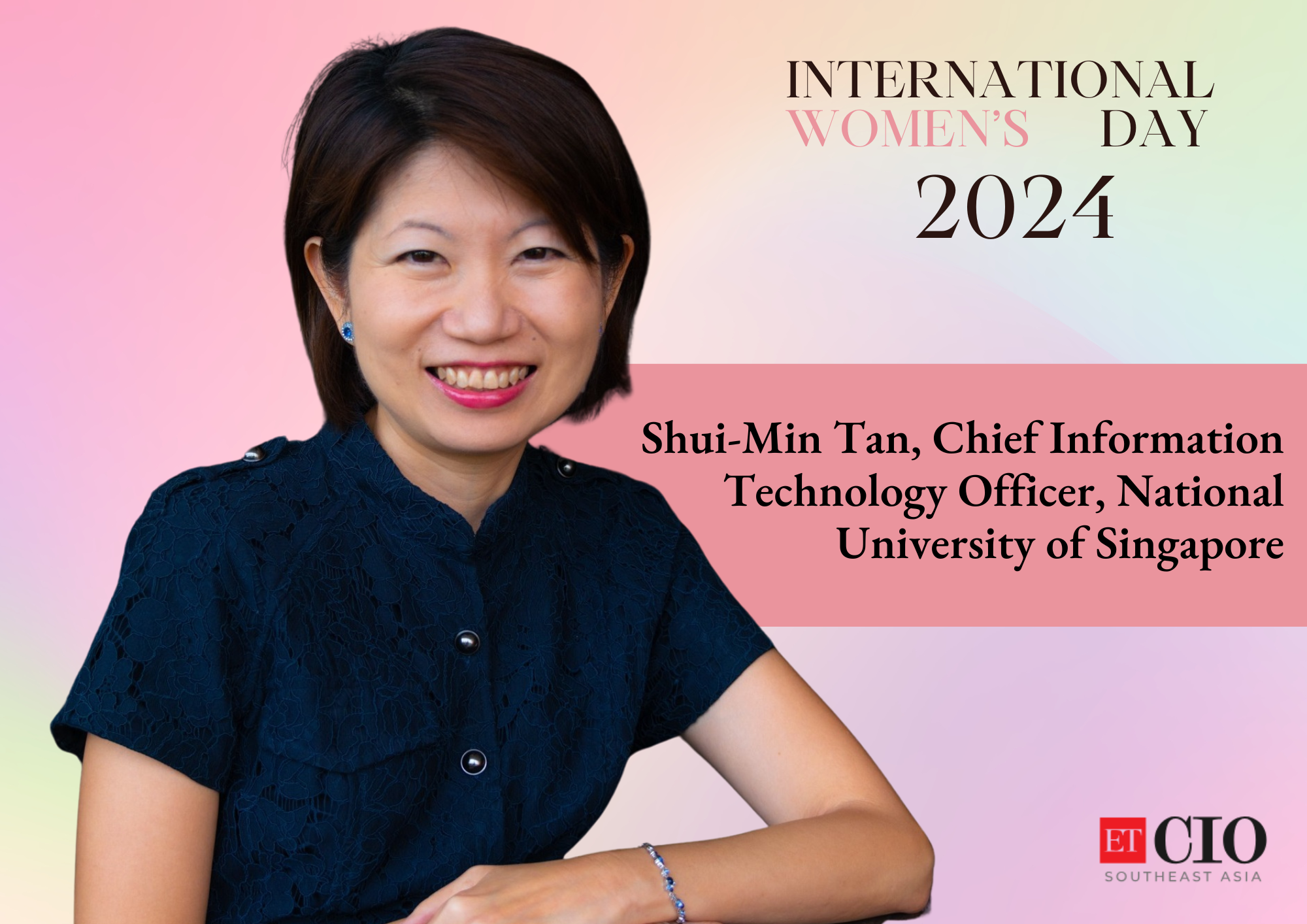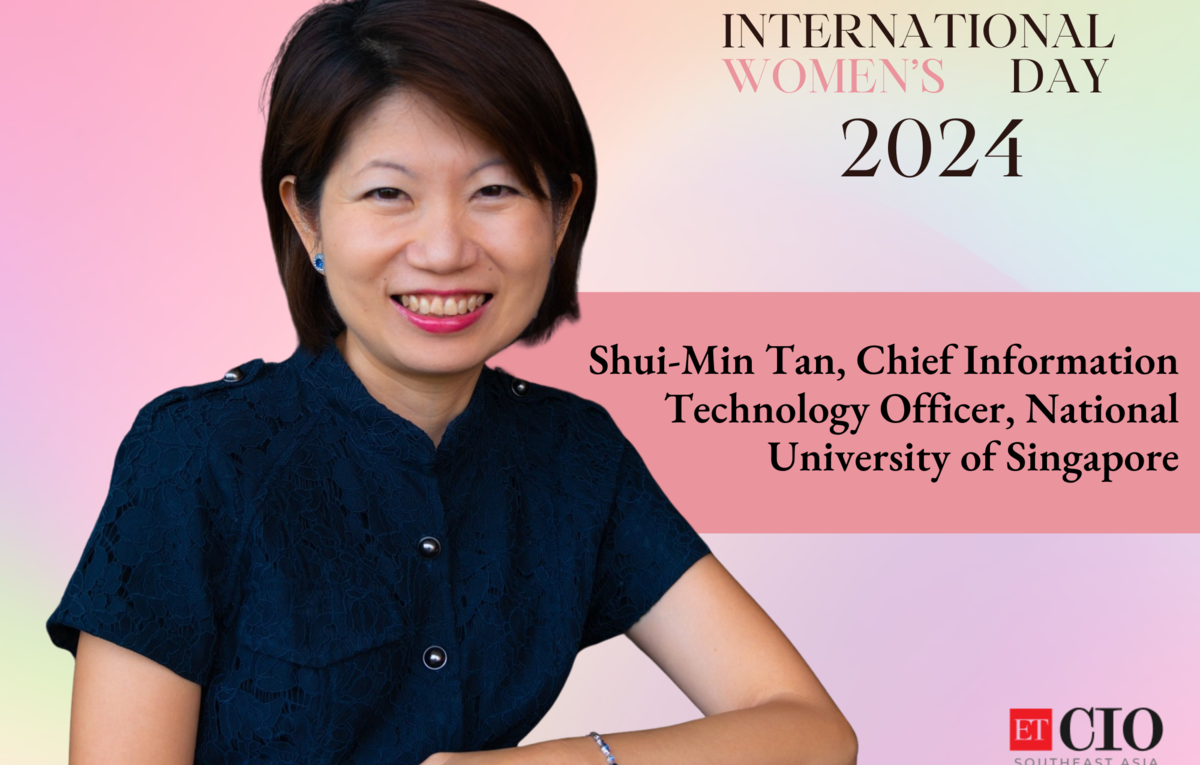
Shui-Min Tan is Chief Information Technology Officer at the National University of Singapore. A seasoned senior IT executive, Shui-Min has extensive experience in leading large teams to deliver innovative, cost-effective and high-performance technology solutions. Prior to NUS, she held the position of Director, Enterprise Management Systems at IHiS (Integrated Health Information Systems.
In an exclusive interaction with us, Shui-Min talks about her priorities as CITO this year, the areas tech leaders will prioritize most for IT spending, and her advice to women when it comes to accelerating advancement in tech careers.
What will be your top priority this year as CITO of the National University of Singapore?
As you know, NUS is a world leading university. We are also the leading university in Singapore. At the heart of this commitment to maintaining our place in the world is our NUS IT vision of building a “University without borders, powered by infinite technology”. That is why our five-year plan is guided by the following four strategies: first, digitally empower business processes in education, research and administration, while increasing the digital fluency of our community; second, to create an infrastructure that is both flexible and stable; third, make sure our cyber fortress is strong enough to protect our digital assets; and finally, foster a workforce that is proactive, digitally savvy and future-ready. As this is our second year of the five-year plan, my top priority is to ensure that we continue the momentum in making significant strides to deliver on the initiatives that underpin the strategies.
What technology are you most excited about this year? How do you plan to implement it at NUS?
I don’t have a specific technology that excites me the most. Rather, at NUS, our approach is to continually evaluate a wide range of technologies and explore their potential applications within our university ecosystem. Our radar includes AI (of course!), mixed reality, 5G, data analytics, green IT infrastructure and cybersecurity.
We strive to use these technologies innovatively to enhance our initiatives. Through the strategic integration of these technologies, we aim to enhance the learning experience for our students, catalyze innovative research endeavours, empower our faculty and staff and strengthen NUS’s position as a leading global university.
Global IT spending is expected to total $5 trillion in 2024, an increase of 6.8% from 2023, according to Gartner, Inc.’s latest forecast. Although generative AI (GenAI) had significant hype in 2023, it will not significantly change IT spending growth in the near future. What areas do you think technology leaders will prioritize the most for spending?
In light of the projected increase in IT spending worldwide and the current technology landscape, it is clear that organizations will prioritize several key areas for investment:
- Cyber Defense: Given the prevalence of data breaches and the escalating threat environment, strengthening cybersecurity measures remains paramount. Tech leaders will continue to invest in robust security measures to protect their digital assets and protect them from cyberattacks
- Sustainability technologies: With a growing emphasis on environmental awareness, organizations tend to invest in sustainability initiatives, and I’m really seeing an uptick in investment in this particular area. This includes adopting energy-efficient IT infrastructure, deploying green data centers and deploying smart building technologies to reduce carbon footprint and optimize resource use.
- Data: Data continues to be the oil of this digital age. Recognizing the critical importance of data in driving business insights and fueling AI solutions, organizations will prioritize investments in data mastery. This includes using advanced tools and methodologies to efficiently curate, collect and analyze data for actionable insights and to drive AI models for improved decision-making and innovation.
By strategically allocating resources in these areas, technology leaders can effectively address evolving challenges, drive digital transformation, and take advantage of emerging opportunities in the ever-evolving IT landscape.
How do you see APAC developing in digital adoption this year? Your only advice to technology leaders when it comes to developing their digital adoption plans.
The Asia Pacific (APAC) region is rapidly adopting digital technologies and this trend is expected to continue this year. Even with a diverse set of economies from emerging to developed, the region is seeing widespread adoption of cloud technologies, AI and e-commerce.
My only advice to technology leaders when developing their digital adoption plans is to take a holistic approach. While technology and tools are crucial components, creating a culture of digital literacy is just as vital. Most importantly, it’s all about considering people, processes and technology in the plan.
Based on our experience at NUS, in addition to investing in technology, we believe in investing in our workforce. After all, we can have the best technology, but if the workforce is not ready, then the organization will not be able to successfully pivot into the digital age. That’s why there’s a big emphasis on lifelong learning at NUS, and that’s where we come in! We at NUS IT play an important role in increasing the digital dexterity of our NUS colleagues, especially our administrative staff on the transformative power of digital tools to improve work processes. And we do this through initiatives such as workshops, light learning sessions, communities of practice, hackathons and other learning activities.
We have seen remarkable growth through this learning journey. Having trained over 4,100 staff members in 275 sessions on more than 15 digital tools, NUS has not only enhanced the capabilities of its workforce but also realized significant savings through innovative solutions developed in-house. The success of the DE journey highlights the importance of user experience in technology adoption.
Although investing time and effort in workforce development may not be the conventional role of the IT department, NUS IT remains committed to its DE program as we strongly believe that for any technology implementation to be successful, it is critical importance for users to skillfully handle the digital solutions we create.
“Inspiring Inclusion” is the theme for this year’s International Women’s Day 2024. What would be your advice to women when it comes to accelerating progress in tech careers?
My advice would be to ignore gender bias and stereotypes. Instead, embrace your unique identity as you pursue your calling with unwavering dedication, integrity, and humility.
Be steadfast in overcoming obstacles, maintain honesty and transparency in your relationships, and approach self-evaluation with humility, always looking for opportunities for growth and improvement.


